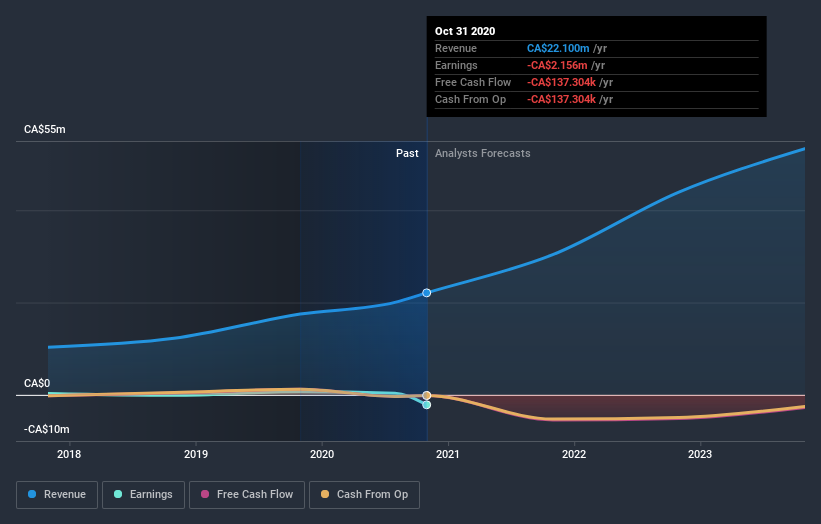What You Need To Know About GURU Organic Energy Corp.'s (TSE:GURU) Investor Composition
A look at the shareholders of GURU Organic Energy Corp. (TSE:GURU) can tell us which group is most powerful. Large companies usually have institutions as shareholders, and we usually see insiders owning shares in smaller companies. I generally like to see some degree of insider ownership, even if only a little. As Nassim Nicholas Taleb said, 'Don’t tell me what you think, tell me what you have in your portfolio.
With a market capitalization of CA$633m, GURU Organic Energy is a small cap stock, so it might not be well known by many institutional investors. Taking a look at our data on the ownership groups (below), it seems that institutions are noticeable on the share registry. Let's take a closer look to see what the different types of shareholders can tell us about GURU Organic Energy.
See our latest analysis for GURU Organic Energy

What Does The Institutional Ownership Tell Us About GURU Organic Energy?
Institutions typically measure themselves against a benchmark when reporting to their own investors, so they often become more enthusiastic about a stock once it's included in a major index. We would expect most companies to have some institutions on the register, especially if they are growing.
We can see that GURU Organic Energy does have institutional investors; and they hold a good portion of the company's stock. This implies the analysts working for those institutions have looked at the stock and they like it. But just like anyone else, they could be wrong. When multiple institutions own a stock, there's always a risk that they are in a 'crowded trade'. When such a trade goes wrong, multiple parties may compete to sell stock fast. This risk is higher in a company without a history of growth. You can see GURU Organic Energy's historic earnings and revenue below, but keep in mind there's always more to the story.

GURU Organic Energy is not owned by hedge funds. Eric Graveline is currently the largest shareholder, with 28% of shares outstanding. Meanwhile, the second and third largest shareholders, hold 26% and 7.9%, of the shares outstanding, respectively. Carl Goyette, who is the third-largest shareholder, also happens to hold the title of Member of the Board of Directors.
After doing some more digging, we found that the top 2 shareholders collectively control more than half of the company's shares, implying that they have considerable power to influence the company's decisions.
Researching institutional ownership is a good way to gauge and filter a stock's expected performance. The same can be achieved by studying analyst sentiments. While there is some analyst coverage, the company is probably not widely covered. So it could gain more attention, down the track.
Insider Ownership Of GURU Organic Energy
While the precise definition of an insider can be subjective, almost everyone considers board members to be insiders. The company management answer to the board and the latter should represent the interests of shareholders. Notably, sometimes top-level managers are on the board themselves.
I generally consider insider ownership to be a good thing. However, on some occasions it makes it more difficult for other shareholders to hold the board accountable for decisions.
Our most recent data indicates that insiders own the majority of GURU Organic Energy Corp.. This means they can collectively make decisions for the company. So they have a CA$405m stake in this CA$633m business. It is good to see this level of investment. You can check here to see if those insiders have been buying recently.
General Public Ownership
With a 29% ownership, the general public have some degree of sway over GURU Organic Energy. While this group can't necessarily call the shots, it can certainly have a real influence on how the company is run.
Next Steps:
It's always worth thinking about the different groups who own shares in a company. But to understand GURU Organic Energy better, we need to consider many other factors. Case in point: We've spotted 1 warning sign for GURU Organic Energy you should be aware of.
If you are like me, you may want to think about whether this company will grow or shrink. Luckily, you can check this free report showing analyst forecasts for its future.
NB: Figures in this article are calculated using data from the last twelve months, which refer to the 12-month period ending on the last date of the month the financial statement is dated. This may not be consistent with full year annual report figures.
If you decide to trade GURU Organic Energy, use the lowest-cost* platform that is rated #1 Overall by Barron’s, Interactive Brokers. Trade stocks, options, futures, forex, bonds and funds on 135 markets, all from a single integrated account. Promoted
New: Manage All Your Stock Portfolios in One Place
We've created the ultimate portfolio companion for stock investors, and it's free.
• Connect an unlimited number of Portfolios and see your total in one currency
• Be alerted to new Warning Signs or Risks via email or mobile
• Track the Fair Value of your stocks
This article by Simply Wall St is general in nature. It does not constitute a recommendation to buy or sell any stock, and does not take account of your objectives, or your financial situation. We aim to bring you long-term focused analysis driven by fundamental data. Note that our analysis may not factor in the latest price-sensitive company announcements or qualitative material. Simply Wall St has no position in any stocks mentioned.
*Interactive Brokers Rated Lowest Cost Broker by StockBrokers.com Annual Online Review 2020
Have feedback on this article? Concerned about the content? Get in touch with us directly. Alternatively, email editorial-team (at) simplywallst.com.
About TSX:GURU
GURU Organic Energy
A beverage company, produces, markets, and distributes natural, plant-based, and organic energy drinks in Canada and the United States.
Excellent balance sheet with reasonable growth potential.
Similar Companies
Market Insights
Community Narratives





